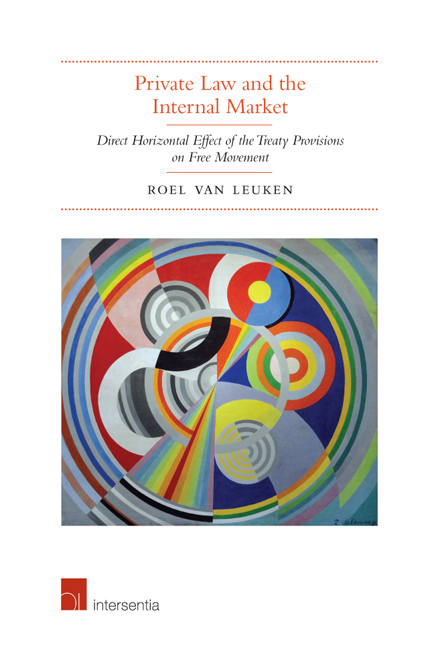 Private Law and the Internal Market
Private Law and the Internal Market Private law and private law relationships are increasingly influenced by the law of the European Union. Sometimes, the consequences are foreseeable, for instance because EU law provides expressly that violation of its rules shall produce a specific private law effect. Well-known examples are the nullity provided for by Article 101(2) TFEU for agreements that prevent, restrict or distort competition within the internal market, and the Union's obligation under Article 340 TFEU, in the case of non-contractual liability, to make good any damage in accordance with the general principles common to the laws of the Member States.
More surprising are the consequences that are generated when the Court of Justice interprets provisions of EU law ostensibly addressed to the Member States, as creating, modifying or extinguishing rights and obligations in legal relationships between individuals (direct horizontal effect). Starting in 1974 the Court has used cases submitted to it as an opportunity to express its views on the possible direct horizontal effect of the TFEU provisions pertaining to the functioning of the internal market, known as the fundamental freedoms (or free movement provisions): Articles 34 and 35 TFEU (free movement of goods), Article 45 TFEU (free movement of workers), Article 49 TFEU (freedom of establishment), Article 56 TFEU (freedom to provide and receive services) and Article 63 TFEU (free movement of capital).
This book was triggered by the fact that the Court of Justice has interpreted a number of free movement provisions of primary EU law as having direct influence on private law relationships. It seeks out the links between the Court's rulings on the issue and examines, by analysing them against the background of the various mechanisms used by EU law to influence national private law, whether the approach taken by the Court to one free movement provision can be predictive for other free movement provisions and if so, to what extent. The research thus gives a clear picture of the possible reach of the influence of the free movement provisions on private law relationships. The attention to the impact which accepting direct horizontal effect has on the kind of justifications that must be available to individuals as a defence to alleged infringement of a free movement provision is a direct corollary of this research.
To save this book to your Kindle, first ensure no-reply@cambridge.org is added to your Approved Personal Document E-mail List under your Personal Document Settings on the Manage Your Content and Devices page of your Amazon account. Then enter the ‘name’ part of your Kindle email address below. Find out more about saving to your Kindle.
Note you can select to save to either the @free.kindle.com or @kindle.com variations. ‘@free.kindle.com’ emails are free but can only be saved to your device when it is connected to wi-fi. ‘@kindle.com’ emails can be delivered even when you are not connected to wi-fi, but note that service fees apply.
Find out more about the Kindle Personal Document Service.
To save content items to your account, please confirm that you agree to abide by our usage policies. If this is the first time you use this feature, you will be asked to authorise Cambridge Core to connect with your account. Find out more about saving content to Dropbox.
To save content items to your account, please confirm that you agree to abide by our usage policies. If this is the first time you use this feature, you will be asked to authorise Cambridge Core to connect with your account. Find out more about saving content to Google Drive.